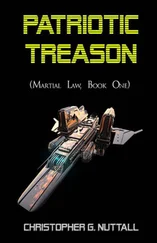“No,” Wachter said, simply. “But I’m damned if I know what I can do about it.”
Smyth had been right, Penny knew. The question of how to treat the prisoners could be referred to the Families Council, which wouldn’t give a damn about the consequences to loyalist personnel. If they were prepared to subject her to a full interrogation, even though it might well have damaged her mind, they wouldn’t hesitate to mind-rip actual traitors. And if they did delay matters long enough for a message to be sent to Earth and back, anything the traitors knew would be outdated.
“Sir,” she said, carefully, “permission to speak freely?”
“Always,” Wachter said.
“This is different,” Penny said. “Sir… what’s going to happen to you now?”
“They will probably send me back into retirement,” Wachter said, dryly. “I’m something of an embarrassment to them.”
“Or they’ll kill you,” Penny said.
“Perhaps,” Wachter agreed.
Penny stared at him for a long moment. “How can you be so calm?”
“There’s no point in getting worked up,” Wachter pointed out. “I knew the job was risky when I took it. I knew that the Families Council were reluctant to appoint me to this position. And yes, I knew it might prove fatal in more ways than one.”
“The rebels only have to worry about us killing them,” Penny muttered. “You have to worry about your masters seeing you as a threat too.”
Wachter nodded, wordlessly.
Penny looked up at him. “Why don’t you take over? Become Emperor?”
Wachter gave her a surprised look, so she powered on. “You have a fleet that will follow you anywhere, one tougher than any other formation in the Empire,” she told him. “Even battered, this fleet is better than Home Fleet. You could take Earth for yourself…”
“And then what?” Wachter interrupted. “The Empress didn’t hold power for long before her reign crumbled.”
“Because the patronage networks undermined her,” Penny said. “ You wouldn’t have that problem!”
Wachter sighed. “I would,” he said. “The Thousand Families didn’t end up ruling the Empire because of their good looks. They control, directly or indirectly, almost all of the industrial base. Even if I managed to purge the Imperial Navy of the patronage networks, which would be almost impossible, I’d never manage to dismantle their control of the industrial production nodes without crippling the Empire. Besides…”
He shrugged. “The Thousand Families compete amongst themselves,” he added. “It was meant, I think, to help keep them reasonably honest, back in the days when the Empire was young. And then some of them had the bright idea of dividing the Empire up amongst themselves, which ensured that competition slowed to a bare minimum until now. But if I took command, with absolute authority, I would still make a mess of it. The Empire is simply too big to be controlled by one man.”
Penny felt tears prickling at the corner of her eyes. “I don’t want you to die,” she confessed. Perhaps the Mind Techs had done far worse to her than she’d realised. “And the Imperial Navy doesn’t deserve to lose you.”
Wachter reached out and gave her a hug. “The Empire is all we have,” he said. “It’s the only way to keep humanity united. But it does have a price.”
Penny allowed herself to relax into his arms for a long moment, then pulled back. He could utterly destroy her now, she knew. It had always been true — but now he could tell Imperial Intelligence that she’d tried to talk him into outright treason. Or he might suspect that she was trying to lure him into saying something incriminating. Imperial Intelligence was fond of such methods, knowing that rumours of their existence would encourage people to reveal any mutinous crewmates for fear that their loyalty was being tested. But somehow she was sure that he wouldn’t breathe a word of what she’d said.
“Here,” Wachter said, quietly. He passed her a handkerchief, which she used to dab her eyes gently. “Don’t worry about me, really. I’ll be fine.”
Penny shook her head. She knew better.
* * *
The holding cell was barely large enough to swing a cat. Jeremy sat on the bunk, trying to massage some feeling back into his wrists. The Marines — and then the black-clad officers who had taken him from them — hadn’t bothered to remove the metal tie, leaving his hands firmly trapped behind his back. Sooner or later, he suspected, they were going to have to untie him just so he could go to the toilet or it was going to get messy.
They didn’t seem to have decided to keep their word, he decided, as the hours wore on. He’d undergone some training for captivity in the academy, but it hadn’t been very detailed. The only people who might take Imperial Navy crewmen prisoners were pirates and they were unlikely to be interested in anything other than rape and possible ransom. Assuming, of course, that their captive was worth anything. Most Imperial Navy crewmen were worthless, as far as the aristocracy was concerned.
He was still mulling over the problem when the hatch slammed open, revealing a pair of masked men. They came forward, grabbed Jeremy’s legs and shackled them together, then spun him around, cut the metal tie free from his hands and then cuffed them again in front of him. Jeremy had a moment to see the red marks around his wrists before they hauled him to his feet and marched him through a series of barren corridors and into a small room. It was empty, apart from a metal table and two chairs.
“Please, be seated,” a male voice said.
Jeremy looked up, surprised, as he was thrust into a chair. The speaker was a middle-aged man, wearing a black uniform. His accent suggested Earth or Mars, probably Mars. Jeremy studied him for a long moment, then looked back at the table. The speaker didn’t look like a naval officer, which suggested he wasn’t the CO who’d won the battle.
“You are, technically speaking, a traitor,” the man said. He didn’t bother to introduce himself. “You could be shot out of hand and no one would give a shit.”
It was a mistake, Jeremy knew, to talk to his captors. But he couldn’t help himself.
“I surrendered on the promise of good treatment,” he pointed out, tartly. “This” — he rattled his cuffs — “doesn’t feel like good treatment.”
The man lifted an eyebrow. “Compared to what we would normally do to traitors?”
“…Point,” Jeremy conceded.
“Let me be blunt,” the man said. He took the seat facing Jeremy and placed his fingertips together, contemplatively. “You were one of the original mutineers. There’s no doubt about that, is there? You served on the Observation Squadron and either knew about the mutiny plans from the start or joined when the plans were put into operation. That makes you a traitor.”
Jeremy said nothing.
“The punishment for traitors is a slow painful death, as I’m sure you’re aware,” the man continued, after a long moment. “Admiral Wachter” — Jeremy started; he recognised the name — “has no authority to make deals with rebels. Not to put too fine a point on it, the promises he made you have no legal power. However, we are prepared to honour the promise in exchange for certain pieces of information.”
Jeremy snorted. “Name, rank and serial number?”
“A bit more than that,” the man said. “Tactical information, the location of your bases, anything other than that…”
“No,” Jeremy said, simply.
The man sighed, loudly. “You seem to believe that you have a choice,” he said. “Information can be extracted from your brain, willingly or unwillingly. The only question is just what state you will be left in, afterwards. People have been known to become vegetables after a session with the mind-rippers. They are quite efficient. Torture can be resisted, drugs can be misled, but direct mental examination can remove all traces of deceit from your mind.”
Читать дальше












